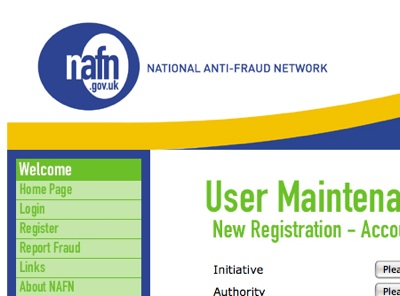
In February 2009 I attended an event which included a presentation by John Peerless of the National Anti-Fraud Network (NAFN), a organisation established by local councils to assist them in fighting fraud. Council officers can log in to the NAFN website and search for information about individuals. The information available via NAFN already includes phone records and information collected by collaborating councils. Phone records include details of debit cards used to top up pay as you go phones as well as information on where pay as you go phones were topped up, even if cash was used.
At the presentation I attended Mr Peerless said that a new NAFN “national centre” was to be operational by April 2009. This new centralised spy HQ for local councils will enable access to “live” information obtained via direct links to phone companies BT and Orange. Mr Peerless also revealed NAFN’s ambitions to start doing some of the spying itsself saying: “the national centre wants to employ investigators to produce intelligence product not just provide a service.” As an Orange customer I am aware that the company has not informed the users of its service about its new level of co-operation with these local council snoopers.
As of the 6th of April 2009 the The Data Retention (EC Directive) Regulations 2009 (implementing Directive 2006/24/EC of the European Parliament ) will come into force. This requires communications service providers to keep records of where and when and between whom phone calls, emails and internet communications (including website visits) occurred. It is possible that the timing of the new NAFN national centre’s opening, at about the same time as this law comes into force, is not coincidental (though there are much more worrying potential uses of that data by other arms of the state than those likely to be thought up by local councils.)
I have written previously about a proposed central database of UK internet traffic, what is coming into force on the 6th of April is not a centralised database, but a retention of information by each telephone and internet company though the Government appear not to have completely dropped one huge database as an ambition. Hopefully people will have a chance to decide, at the next general election, if that is what UK citizens want.
It is not at all clear to me what process councils, the police and the no-doubt hundreds of state agencies which would like to access the recorded data will have to go through, especially with respect to accessing live data on communications. Presumably a search warrant will be required (if demanded) for access to retained data, and a RIPA authorisation for live data.
Mr Peerless said back in February that NAFN wanted to promote its range of services to its members, I am interested to see what range of services is currently being promoted to councils. Cambridge City Council has, in the past at least, been a member of NAFN and as they are my local council I thought I would make a freedom of information request to them, using the whatdotheyknow.com website to archive any response in a publicly accessible manner. I hope to gain a better understanding of the services NAFN offers local councils, and in particular what they are about to add to their range of services. I am anticipating I might get a copy of a brochure offering a new menu of “live” spying services to be offered from some point in April.
To obtain information, currently a RIPA authorisation process has to be followed, during which the proportionality of the intrusion is weighed against the suspected crime. The authorisation process also ensures that a trained, relatively senior, council official confirms that the obtaining the proposed information is lawful and appropriate. I have asked for details of the safeguards which are employed with respect to information obtained from NAFN.
My request for information in full:
Could you please let me know if Cambridge City Council is a member of the “National Anti-Fraud Network” (NAFN)?
If the council is a member, or uses the network’s services, could you please release:
- The contract (or equivalent document) between the council and the NAFN.
- If not included in the contract, information on the costs to the council of being a member. Including subscription fees, charges for services, and any staff or equipment made available to the network.
- Information on the benefit the council has gained from its work with NAFN, including which services it has used, how often, and for what purposes.
- Details of any safeguards in place to ensure that information is only requested from NAFN in circumstances where obtaining that information is proportionate.
Following the establishment of a NAFN “national centre”, new services such as live information (eg. on phone calls in progress) are to be offered by the NAFN from April 2009. Could you please release any details you have about these new services. I would also like information relating to any decision the council has made to use, or not use, specific services offered.
Finally, if Cambridge City Council is no longer a member of NAFN (there is evidence it was a member in 2005 (see appendix A)), could you let me know why, and when, it ceased to be a member.
One response to “Council Spy HQ to Commence Operations”
I look forward with interest to the results of your request.